| The Pick of Billy Connolly | ||||
|---|---|---|---|---|
 | ||||
| Compilation album by | ||||
| Released | November 1981 | |||
| Genre | Stand-up comedy | |||
| Label | Polygram | |||
| Billy Connolly chronology | ||||
| ||||
| Review scores | |
|---|---|
| Source | Rating |
| Allmusic | |
The Pick of Billy Connolly is a Billy Connolly compilation album.
| The Pick of Billy Connolly | ||||
|---|---|---|---|---|
 | ||||
| Compilation album by | ||||
| Released | November 1981 | |||
| Genre | Stand-up comedy | |||
| Label | Polygram | |||
| Billy Connolly chronology | ||||
| ||||
| Review scores | |
|---|---|
| Source | Rating |
| Allmusic | |
The Pick of Billy Connolly is a Billy Connolly compilation album.
The album contained the following tracks: [2]
| Chart (1982) | Peak position |
|---|---|
| Australian (Kent Music Report) | 34 [3] |

Sir William Connolly is a Scottish actor, retired comedian, artist, writer, musician, and television presenter. He is sometimes known by the Scots nickname the Big Yin. Known for his idiosyncratic and often improvised observational comedy, frequently including strong language, Connolly has topped many UK polls as the greatest stand-up comedian of all time. In 2022 he received the BAFTA Fellowship for lifetime achievement from the British Academy of Film and Television Arts.

"Hush" is a song written by American composer and musician Joe South, for recording artist Billy Joe Royal. The song was later covered by Somebody's Image in 1967. It reached #15. It was also covered by Deep Purple in 1968 and by Kula Shaker in 1997. Each artist had a Top 5 hit with their version.

"Uptown Girl" is a song written and performed by American musician Billy Joel. The lyrics describe a working-class "downtown man" attempting to woo a wealthy "uptown girl". It was released on September 29, 1983, on his ninth studio album, An Innocent Man (1983). The 12" EP has the tracks "My Life", "Just the Way You Are" and "It's Still Rock and Roll to Me", whereas some 7" single versions featured "Careless Talk" as a B-side.

"Just the Way You Are" is a song by Billy Joel from his fifth studio album The Stranger (1977). It was released in September 1977 as the album's lead single. It became both Joel's first US Top 10 and UK Top 20 single, as well as Joel's first gold single in the US. The song also topped the Billboard Easy Listening Chart for the entire month of January 1978.

Anticipation is the second studio album by American singer-songwriter Carly Simon, released by Elektra Records, in November 1971.
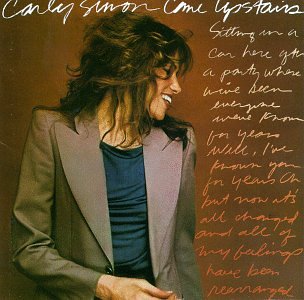
Come Upstairs is the ninth studio album by American singer-songwriter Carly Simon, released by Warner Bros. Records, on June 16, 1980.
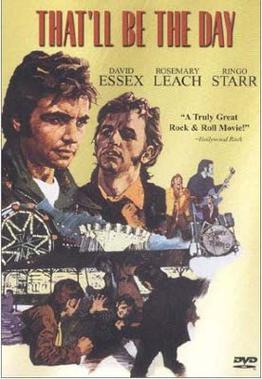
That'll Be the Day is a 1973 British coming of age drama film directed by Claude Whatham, written by Ray Connolly, and starring David Essex, Rosemary Leach and Ringo Starr. Set primarily in the late 1950s and early 1960s, it tells the story of Jim MacLaine (Essex), a British teenager raised by his single mother (Leach). Jim rejects society's conventions and pursues a hedonistic and sexually loose lifestyle, harming others and damaging his close relationships. The cast also featured several prominent musicians who lived through the era portrayed, including Starr, Billy Fury, Keith Moon and John Hawken. The film's success led to a sequel, Stardust, that followed the life of Jim MacLaine through the 1960s and 1970s.
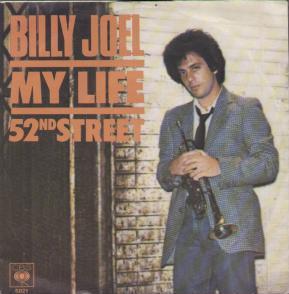
"My Life" is a song by Billy Joel that first appeared on his 1978 album 52nd Street. A single version was released in the fall of 1978 and reached No. 2 on the U.S. adult contemporary chart. Early the next year, it peaked at No. 3 on the Billboard Hot 100.

"When Will I See You Again" is a song released in 1974 by American soul group The Three Degrees from their third album, The Three Degrees. The song was written and produced by Kenny Gamble and Leon Huff. Sheila Ferguson sang the lead, accompanied by Fayette Pinkney and Valerie Holiday. Billboard named the song #67 on their list of 100 Greatest Girl Group Songs of All Time.
"No Charge" is a country music song, written by songwriter Harlan Howard. It was first recorded by country singer Melba Montgomery, whose 1974 version was a #1 country hit in both the US and Canada, as well as making #39 on the US pop charts. In the UK, the song is associated with J.J. Barrie, whose 1976 version was a #1 UK hit.

The Pacific Age is the seventh studio album by English electronic band Orchestral Manoeuvres in the Dark (OMD), released on 29 September 1986 by Virgin Records. It was the last of two OMD studio albums produced by Stephen Hague, after Crush (1985). The record exhibits the same refined production values as its predecessor while venturing into the realm of mid-1980s sophisti-pop, retreating further from the group's experimental beginnings.
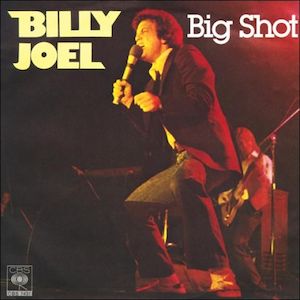
"Big Shot" is a song performed by Billy Joel from his 1978 album 52nd Street as its opening track, released as a single in early 1979. The song would become the second hit single from the album, peaking at #14 in the United States.

"Pressure" is a 1982 song by American musician Billy Joel released as a single from the album The Nylon Curtain and reached #20 on the US Billboard Hot 100. The synthesizer-driven rock song tells about the pressure of creating and the pressure of being a provider.

"The Most Beautiful Girl" is a song recorded by Charlie Rich and written by Billy Sherrill, Norro Wilson, and Rory Bourke. The countrypolitan ballad reached No. 1 in the United States in 1973 on three Billboard music charts: the pop chart, the country chart, and the adult contemporary chart, as well as in Canada on three RPM charts: the RPM 100 Top Singles chart, the Country Tracks chart, and the Adult Contemporary chart. Billboard ranked it as the No. 23 song for 1974.
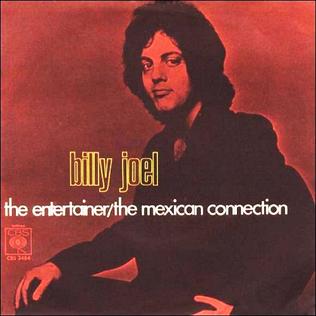
"The Entertainer" is a single by singer Billy Joel released as the only single from his 1974 album Streetlife Serenade. The song peaked at #34 on the US charts. The song is a cynical and somewhat satirical look at the fleeting fame of a musician and fickle public tastes ; this theme would be examined in the later song "It's Still Rock and Roll to Me".

"D-I-V-O-R-C-E" is a song written by Bobby Braddock and Curly Putman, and recorded by American country music artist Tammy Wynette. It was released in May 1968 as the first single and title track from the album D-I-V-O-R-C-E. Wynette's version was a number one country hit in 1968 and earned her a Grammy nomination for Best Country Vocal Performance, Female.

"Say Goodbye to Hollywood" is a song written and performed by Billy Joel, first released in 1976 on his album Turnstiles as its opening track. It was originally released in the United States as the B-side to "I've Loved These Days" before being re-released a month later as an A-side single with "Stop in Nevada" as the B-side. However, the song achieved greater recognition in 1981 when a live version from Songs in the Attic was released as a single, with the live version of "Summer, Highland Falls" as a B-side. Joel wrote the song after moving back to New York City in 1975; he had previously relocated to Los Angeles in 1972 in an attempt to get out of an onerous record deal. The man who represents this song on the Turnstiles album is the man wearing sunglasses and holding a suitcase.

Funny Girl is the soundtrack album to the 1968 musical film of the same name, performed by its star Barbra Streisand. Released on the vinyl album format in stereo in 1968, the soundtrack was subsequently released in quadraphonic sound vinyl, cassette, and compact disc. The titles "Second Hand Rose" and "Exit Music" are omitted from the commercially released soundtrack editions. The soundtrack is featured in "Billboard Greatest albums of all time"., National Public Radio's "The Greatest Albums Made By Women"

"It Don't Hurt Like It Used To" is a song co-written and recorded by American country music artist Billy Currington. It was released to radio on February 8, 2016 as the third single from his 2015 album, Summer Forever. Currington wrote this song with Cary Barlowe and Shy Carter.

Kids Say the Darndest Things is a compilation album by American country artist, Tammy Wynette. It was released on April 23, 1973 via Epic Records and contained 11 tracks. The disc was a concept album centering around children and domestic life. The title track was the lead single from the album and topped the country charts in 1973. The album itself also made the American country albums chart. It received positive reviews from critics.